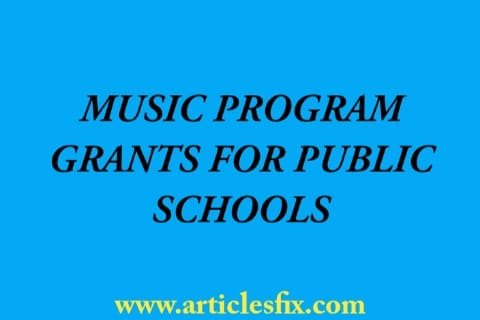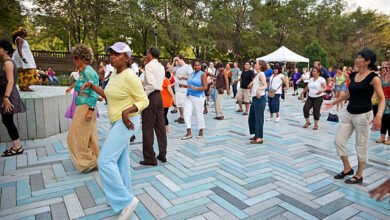11 Cool Music Program Grants for Public Schools In The United States

If you are tired of having to cut music programs out of your school curricula due to poor funding, music program grants for public schools can help.
Frankly, music has always been and will always be an essential part of our lives, hence the need to introduce it to the average American kid from an early age. But, what happens when funds dry up and public schools find themselves unable to pay for music programs?
In the United States, there are many who think of music education as a luxury, something that is only available to those who can afford it. However, it is a vital part of every child’s development and should be a necessity rather than an option. However, a number of public schools require assistance when it comes to funding their music programs. Thankfully, there are a number of grants and organizations that provide financial support to these schools.
What are music program grants?
Music program grants are a type of financial aid that can help cover the costs of starting or expanding a music program in a public school. These grants are typically awarded by government agencies or private foundations, and can range in size from a few hundred dollars to several thousand.
While most music program grants are open to any public school, some may have specific requirements, such as serving a certain number of students from low-income families or being located in a rural area.
Who is eligible for music program grants?
The vast majority of music program grants are awarded to public schools. And in order to be eligible, a school must first demonstrate a need for the funding. This can be done by showing that the school does not have enough money to sustain a music program, or that the music program is in danger of being cut due to budget constraints. Once a school demonstrates need, it will then be considered for funding on a first-come, first-served basis.
How can music program grant funds be used?
The funds from music program grants can be used in a variety of ways to support public school music programs. Some of the ways the funds can be used include:
- Purchasing new musical instruments or equipment
- Hiring additional music teachers or instructors
- Providing scholarships for students to attend music camps or workshops
- Funding after-school music clubs or groups
- Sponsoring musical performances or events
No matter how the funds are used, one thing that is constant is that, they can make a big difference in the quality and availability of public school music programs.
Benefits of music program grants for public schools
There are many benefits that public schools can receive from music program grants. These grants can help to cover the costs of musical instruments, sheet music, and other necessary supplies. They can also help to pay for the salaries of music teachers. In addition, music program grants can provide funding for after-school music programs and special events such as concerts and workshops.
Music program grants can have a positive impact on public school students in a number of ways. This is because studies have shown that students who participate in musical activities tend to do better in school overall. They often have higher grades and test scores, and are more likely to graduate from high school. In addition, students who participate in music programs often have higher self-esteem and are more confident.
What are the requirements for schools to receive these grants?
In order to receive a grant from the Music Education Program, schools must meet certain requirements. These requirements include providing music education for all students, hiring qualified music teachers, and having a curriculum that meets national standards. While these requirements may seem daunting, they are essential in ensuring that students receive a high-quality music education.
Who provides these grants?
The majority of music program grants for public schools in the United States come from the federal government. But that is not to say that they are the only source of grant money for music program grants for public schools as there are a number of private foundations and corporations providing the same financial assistance.
How can schools apply for these grants?
Ideally, there is no way to apply for music program grants for public schools, other than that you need to search grant databases to find one that suits your needs. In respect of this, the U.S. Department of Education offers a number of grants that can be used to fund music programs in public schools. To learn more about these grants and how to apply for them, visit the Department of Education’s website or contact your state’s education department.
If you are looking to get music program grants for public schools form private foundations and corporations, then there is a need to search the website of the foundation in order to find what you really need.
Some music program grants for public schools
1. The American Country Music Lifting Lives Grant
The American Country Music Lifting Lives Grant provides funding for music programs in public schools across the United States. The grant is open to any public school that offers a music program, and can be used to cover the costs of musical instruments, equipment, or instruction.
Since its inception, the American Country Music Lifting Lives Grant has awarded over $9 million to charitable causes as the program continues to ensure that public school students have access to quality music education. If you know of a public school that could benefit from this grant, be sure to encourage them to apply!
2. ASCAP Foundation Grants
The ASCAP Foundation accepts submissions from other 501(c)(3) organizations engaged in music education and talent development initiatives that are aligned with the foundation’s goals only upon invitation. The ASCAP Foundation program report must be finished by current grant recipients at the end of the project. No later than October 1st, reports must be submitted. Programs that finish after October 1st may be given special consideration.
3. Associated Chamber Music Players Grant
The ACMP Foundation offers funding to encourage chamber music performance for the enjoyment of persons of all ages and musical experience levels from across the world. The ACMP Foundation was established in 1993 and has given out more than 3,000 grants totaling more than $4 million for continuing initiatives and one-off initiatives encouraging participatory chamber music events around the world.
Workshop organizers, charitable organizations, local and international institutions, as well as private citizens and groups, are among the recipients of ACMP grants. Grantees are not required to have non-profit or charitable status by the ACMP Foundation (501c3 in the U.S.).
4. BMI Foundation Grant
Annual awards will be given out by the BMI Foundation to promote the composition, performance, and academic study of current music. The classical, jazz, and musical theatre genres are prioritized, and programs that directly support American live composers and music education are preferred.
The eminent songwriters, composers, and publishers who serve as the Foundation’s Artistic Consultants offer their expertise while the Foundation board makes funding decisions. Grant cycles are only available through invitation. Unsolicited applications won’t be taken into consideration.
5. D’Addario Foundation
So that individuals who are passionate about supporting music education don’t have to, the D’Addario Foundation is committed to carefully evaluating the non-profit partner programs.
The D’Addario Foundation gives funds to more than 200 non-profit music education groups, including public schools, each year through a strict biannual application procedure.
ALSO READ: Grants For Substance Abuse Treatment In The United States
6. Fender Music Foundation
Grants from the Fender Music Foundation are given to music academies, schools, neighborhood music programs, and national music programs all over America, with a focus on in-class music classes where students create music, after-school music programs not managed by schools, and music therapy programs where participants create music. Up to 8 instruments will be given away by the foundation.
Programs must be created, continuing, and sustained in order to qualify, and they must teach music to anyone, regardless of age, who would not otherwise have access to it. We accept applications on a continuous basis.
7. Kinder Morgan Grant
The Kinder Morgan Foundation has a grant to support public school music programs in the United States. The grant will be used to provide funding for music education initiatives, including instruments, equipment, and supplies.
The Mockingbird Foundation is a non-profit organization that provides grants for music education programs in public schools. The foundation was established in 1997 by a group of parents and music educators who were concerned about the lack of funding for music education in the United States.
Through competitive grants, grants for unexpected expenses, and grants for tours, the Mockingbird Foundation has contributed more than a million dollars to sponsoring music education for kids. A two-tiered grant application process that is among the most competitive is used to award competitive awards.
The Mockingbird Foundation is committed to ensuring that all children have access to quality music education. If you are interested in supporting the foundation, you can make a donation or purchase merchandise from their website.
9. National Endowment For The Arts
The National Endowment For The Arts is a great resource for music program grants for US public schools. They have a variety of grant programs that can help with start-up costs, ongoing expenses, and professional development for music educators.
The National Endowment for the Arts (NEA) is the only public or private arts funder in the country that offers access to the arts in all 50 states, the District of Columbia, and federally recognized territories. We give out tens of thousands of grants year to give everyone in the US access to a variety of artistic experiences.
They offer cost-share matching grants to nonprofit groups for a range of artistic endeavors, and collaboration agreements with the 62 state/jurisdictional arts agencies and regional arts organizations.
10. Sharon Gewirtz Kids To Concerts
Sharon Gewirtz is the author of Kids To Concerts, a blog that covers music programs and grants for US public schools. Sharon provides information on how to get started with a music program, what types of grants are available, and how to sustain a program once it’s up and running. She also offers advice on how to select repertoire and create a concert schedule that will engage and excite students.
The Gewirtz Fund’s goal is to encourage young people to develop a stronger bond with string music. We provide funding for a range of projects, with a focus on directly addressing the unmet needs of organized string music programs, mentoring programs, and elite concert opportunities.
The Gewirtz Fund will allocate discretionary funding to concepts and programs that will have the biggest influence on non-profit music programs across the country. Throughout the year, grants will be given out depending on funds availability, requests, and best impact.
11. Save the music foundation’s music program grants
Public school districts across the country who exhibit an urgent need for assistance and resources to launch or improve their music education programs are partnered with by Save The Music. Prior to our relationship, these school districts had a small inventory of instruments and materials and frequently served Title I schools with a high proportion of kids eligible for free and reduced lunches.
For the sake of student achievement and access to a well-rounded education, our partner districts are dedicated to funding and establishing in-school music education programs. Applications for Save The Music grants are only made available to certain school sites by invitation following the establishment of a partner school district.
However, in a bid to enhance fairness and access to music education in these areas, Save The Music is now concentrating on the following community and state-wide partnerships (in no particular order):
- Northern California
- Southern California
- Louisiana
- Tennessee
- Mississippi
- Ohio
- Metropolitan Detroit, MI
- West Virginia
- Atlanta, GA
- Miami/Southern Florida
- Philadelphia, PA
- Baltimore, MD
- New York City, NY
- New Jersey
Any of these music program grants for public schools could come in handy when you need to keep the wheel of music education moving in your school.
Conclusion
There are many music program grants available for US public school and hese grants can help fund new programs or improve existing ones. However, if you are interested in applying for a grant, be sure to do your research and find one that best suits your needs.
Also, remember that there are many different types of grants available, so there is sure to be one that can help your school’s music program thrive.
Good luck!




